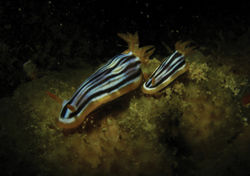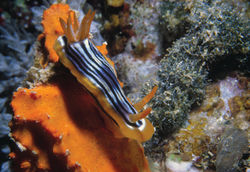Chromodoris strigata
| Notice: | This page is derived from the original publication listed below, whose author(s) should always be credited. Further contributors may edit and improve the content of this page and, consequently, need to be credited as well (see page history). Any assessment of factual correctness requires a careful review of the original article as well as of subsequent contributions.
If you are uncertain whether your planned contribution is correct or not, we suggest that you use the associated discussion page instead of editing the page directly. This page should be cited as follows (rationale):
Citation formats to copy and paste
BibTeX: @article{Yonow2018ZooKeys, RIS/ Endnote: TY - JOUR Wikipedia/ Citizendium: <ref name="Yonow2018ZooKeys">{{Citation See also the citation download page at the journal. |
Ordo: Nudibranchia
Familia: Chromodorididae
Genus: Chromodoris
Name
Chromodoris strigata Rudman, 1982 – Wikispecies link – Pensoft Profile
- Chromodoris strigata Rudman, 1982: 229–231, figs 17E, 26, 27 (Queensland, Australia; Madagascar); Yonow 2008[1]: 60, 177 (Gulf of Eilat, Red Sea); Tibiriçá et al. 2017[2]: 20, fig. 4C (Mozambique).
Material
Al Fanadir, near Hurghada, Egypt, 26 May 2009, two specimens 16 and 11 mm (preserved), leg. and photograph S Kahlbrock; numerous photographs from northern Egypt, S Kahlbrock and J Hinterkircher; numerous photographs from the Creek, Jeddah, Saudi Arabia, 1970–1994, W Pridgen.
Description
Photographs of the two specimens depict the typical pattern of this species in the Red Sea (Plate 1): there are five black lines on the dorsum, which are broken in the larger specimen. These have the characteristic blurring behind the rhinophores, mid-body, and in front of the gills where the white in-between the black is darker. The middle black line runs anteriorly between the rhinophores. There is a submarginal white band completely encircling the notum followed by a thicker yellow-orange margin. The dorsal surface of the foot is white with an orange margin and two black lines that do not meet on the tip of the tail. The rhinophores are either the same colour as the mantle margin or more orange. The 7–9 gills are the same colour as the rhinophores and bear white pinnules.
The body is elongate and the mantle is raised just in front of the gills. The foot is long and pointed, nearly 1/3 to 1/4 longer than the body length. The rhinophores are long and pointed, usually held out over the sides of the body in a characteristic manner. The gills are simply pinnate, arranged in a circle that is not closed posteriorly; the last gills are smaller than the others.
Distribution
These are the first specimen records from the Red Sea but an individual had been photographed in the Jeddah area of the Red Sea as early as the 1970’s (W Pridgen pers. comm., Plate 2). There are subsequent records from the northern Red Sea (Yonow 2008[1]) although it was never collected by the author. Chromodoris strigata is a western Pacific species with one record in the Indian Ocean, from Mozambique (Tibiriçá et al. 2017[2]). The records from India as C. strigata (and C. colemani, Sreeraj et al. 2012[3]) are most likely C. cf. hamiltoni Rudman, 1977 as are the records from Mozambique of Chromodoris sp. 1 (Tibiriçá et al. 2017[2]).
Taxon Treatment
- Yonow, N; 2018: Red Sea Opisthobranchia 5: new species and new records of chromodorids from the Red Sea (Heterobranchia, Nudibranchia, Chromodorididae) ZooKeys, (770): 9-42. doi
Images
|
Other References
- ↑ 1.0 1.1 Yonow N (2008) Red Sea Sea Slugs. Pensoft Publications, Sofia/Moscow, 304 pp.
- ↑ 2.0 2.1 2.2 Tibiriçá Y, Pola M, Cervera J (2017) Astonishing diversity revealed: an annotated and illustrated inventory of Nudipleura (Gastropoda: Heterobranchia) from Mozambique. Zootaxa 4359(1): 1–133. https://doi.org/10.11646/zootaxa.4359.1.1
- ↑ Sreeraj C, Sivaperuman C, Raghunathan C (2012) Addition to the Opisthobranchiate (Opisthobranchia, Mollusca) fauna of Andaman and Nicobar Islands, India. Galaxea, Journal of Coral Reef Studies 14: 105–113. https://doi.org/10.3755/galaxea.14.105

